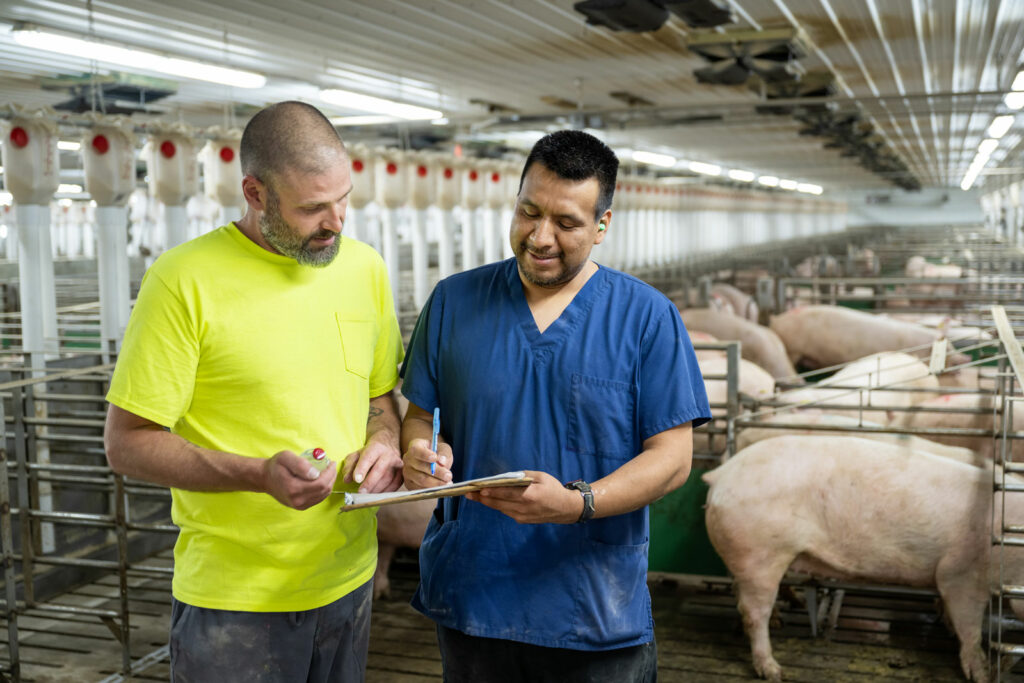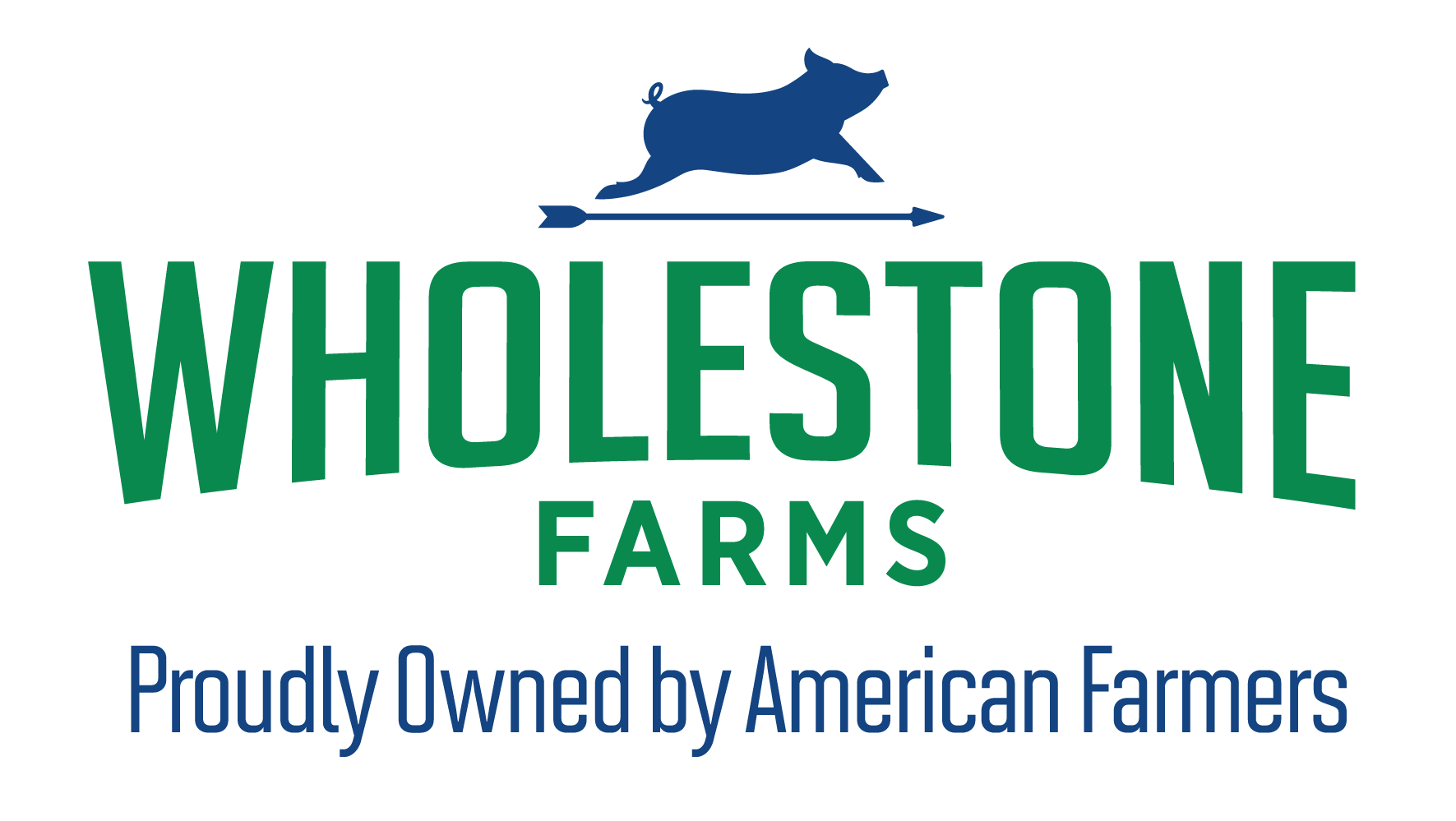Antibiotic stewardship
Responsible Antibiotic Stewardship Practices

Antimicrobial resistance is a complex subject. Antimicrobial resistance has been identified around the globe as a public health crisis in human medicine1. There is growing recognition that multiple factors can have dramatic impact on antimicrobial resistance in populations2. To reduce the development of resistance and prolong the effectiveness of antimicrobials, stewardship of antimicrobials in both human health and veterinary medicine is essential.
Responsible antibiotic stewardship practices include measures that protect the efficacy of antibiotics while preserving animal health and welfare3. Good stewardship programs include prevention efforts including best management practices, strict biosecurity protocols, and informed vaccination strategies. Monitoring antibiotic usage is a key piece to stewardship which involves tracking & reviewing antibiotic use on-farm.
Wholestone Farms’ producer-owners understand the importance of antibiotic stewardship and live it out on their farms. RC Family Farms, based in Northwest Iowa, is a family farm that is leading the way in herd health management. RC Family Farms purchases pigs from sow farm owners on spot market and contracts which leads to a variety of health profiles across their wean to finish operation. Recognizing there are health risks, they have a dedicated health team, including two on-staff veterinarians, who prioritize understanding the health and genetic profiles of their animals – every farm, every day. The health team works to customize their prevention and treatment protocols based on each group’s medical history as well as the health history at the grow-finish farm and neighborhood where the pigs will be housed.
Prevention is key. RC Family Farms protects health through biosecurity, vaccinations and creating the best environment for the animals to live. Proper management techniques and critical care of animals at the start of weaning has been a top priority for the team. RC Family Farms starts each group with a specialized care protocol, reviews animal care protocols with their team regularly, and focuses on the basics (the right feed, adequate clean water, and optimal temperature and ventilation to ensure a comfortable environment). Sanitation of the barns and trailers is imperative in breaking disease cycles. The RC Family Farm’s team also focuses on details such as using hot water for power washing, rotating the class of disinfectants that they are using, and conducting audits on washing which has helped reduce disease prevalence. Specialized autogenous vaccines are another tool that RC Family Farms uses to drive change and improve health. Science supports the idea that using effective vaccinations can help reduce antibiotic usage4.
Communication and early detection are key. Tracking pig health through farm visits, conversations, and the EveryPig app are important steps towards antibiotic stewardship. Many of the RC Family Farms sites are concentrated in areas with high pig density, increasing the risk of health challenges. Their use of technology to facilitate quick responses to health challenges allows them to use less medication. The EveryPig app collects data entered by the producer or caretaker on a daily basis. The app filters daily information to highlight health challenges so RC Family Farms’ veterinarians can investigate and respond quickly. While some investigations merit farm visits, many are conducted within the app or via phone by conversation with the caretaker and review of the group’s health history.
Data allows the health team to make science-based decisions. Critical conversations with referring veterinarians have allowed the health team to gather disease history about potential challenges and get ahead of problems. Regular review of antibiotic usage assists in identifying trends and influences future medication decisions. Working with the local veterinary clinic for timely antibiotic sensitivity diagnostics has informed and streamlined medication decisions in certain difficult cases.
Wholestone Farms shares this desire for data to inform science-based decision making. That is why we require all producers delivering to Wholestone Farms to report their total antibiotic usage on an annual basis. We will continue to gather and monitor antibiotic usage data. Additionally, we are collaborating with partners in opportunities to better understand antibiotic resistance on farm and at the plant to comprehend how our practices are impacting antibiotic stewardship and public health. Check out Wholestone Farms’ annual Sustainability Report to review our antibiotic use data.
Back on the farm, caring for the animals is a top priority and this includes being able to treat the pigs with an antibiotic when necessary. So, how does the RC Family Farm team accomplish this level of animal husbandry and antibiotic stewardship? It starts with having the right culture – a commitment to caring for and developing relationships with everyone involved in taking care of the animals from wean to market. This is further reinforced by clear communication and compliance with protocols through tools like the EveryPig app which has been an important driver. Properly equipped, the team has the drive and desire to do the right thing for the pig every day.
**Written in collaboration with Megan Bomgaars Roos, VP & General Counsel; Dr. Brent Carmichael, on-staff veterinarian and Director of Production for RC Family Farms; and Dr. Carissa Odland, Wholestone Farms.
References:
- World Health Organization. Antimicrobial Resistance Fact Sheet. 2023 Nov 21. Antimicrobial resistance (who.int)
- Noyes NR, Slizovskiy IB, Singer RS. Beyond Antimicrobial Use: A Framework for Prioritizing Antimicrobial Resistance Interventions. Annu Rev Anim Biosci. 2021 Feb 16;9:313-332. doi: 10.1146/annurev-animal-072020-080638. PMID: 33592160.
- Center for Veterinary Medicine, FDA, Antibiotic Stewardship in Veterinary Medicine (fda.gov)
- Bak H, Rathkjen PH. Reduced use of antimicrobials after vaccination of pigs against porcine proliferative enteropathy in a Danish SPF herd. Acta Vet Scand. 2009 Jan 7;51(1):1. doi: 10.1186/1751-0147-51-1. PMID: 19128459; PMCID: PMC2633004.

